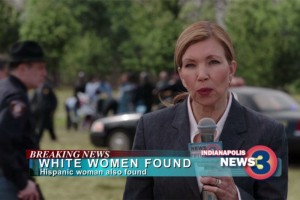At one point in Color Adjustment (1991), someone (I unfortunately can’t remember who) commented that TV is a sponsored medium. The speaker made hand motions indicating that because of this, society progresses at a faster rate than TV shows in dealing with race. This got me thinking about Netflix. Because it does not rely on ads, Netflix has the freedom to be as progressive as it wants; the success of a show relies more on the content of the show itself than ad sponsors. A show such as Orange is the New Black demonstrates how a show that is not completely white washed and focuses predominately on women and their relationships with one another, both gay and straight. It is the only show I can think of where the number of women dramatically outnumber the men and where the problems at hand do not revolve around a guy. That’s pretty impressive to me and demonstrates how without the constraint of ad sponsors, shows can really be bold and progressive.
Another Netflix show that came to mind was Unbreakable Kimmy Schmidt, which was released in March, was initially met with almost universal praise. About halfway through watching the season, I realized how amazing it was that like OITNB, this show does not rely on straight white males in its central cast. In fact, there isn’t a single straight white male in the main cast of the show. Instead, the core of the show is comprised of women and a gay black man.
After a few weeks of total praise, however, many people came forward and criticized how the show deals with race. I’ll go ahead and say that personally I love the show and didn’t find the race stuff to be offensive. I also recognize, however, that I am a white girl watching the show, so none of the race issues addressed directly related to me or my identity. The show did in fact deal with a lot of race issues. The gay black character Titus gets a job as a werewolf waiter at a themed restaurant and finds he’s treated better in costume than as an ordinary black man in New York City. The main character Kimmy has a romance with an Asian immigrant and in fact choses to be with him over a white man. The upper-class socialite Jacqueline is revealed to actually be Native American and only posing as a white woman in order to get ahead in society. And there was this image at the very beginning of the show, when Kimmy and three other women were rescued from an underground bunker:
I personally found these things funny, subversive, and stimulating. These jokes or story lines were bold and daring to me, offering an edgy perspective that not many other shows are willing to offer. To many critics, however, it was blatant racism. If you Google “unbreakable jimmy schmidt race,” countless articles come up with people complaining about how the show handles race. Here is a link to one of the articles: http://www.thedailybeast.com/articles/2015/03/09/the-dong-problem-how-unbreakable-kimmy-schmidt-deals-with-race.html. One of the show’s stars, Tituss Burgess, called the race controversy “ridiculous” in an interview with the Huffington Post (http://www.huffingtonpost.com/2015/03/19/tituss-burgess-unbreakabl_n_6905292.html?ncid=tweetlnkushpmg00000067). On the one hand, one could argue that of course he is going to say that publicly, he wants to keep his job. On the other hand, it is possible that he genuinely thinks the controversy is ridiculous. I personally would like to think that if he found the race to be handled in too insensitive of a manner that he wouldn’t choose to associate with the project in the first place. Perhaps it’s idealistic, but I like to think that people stand up for their values, even at the cost of a job.
Additionally, it does bear importance to say that the show was originally developed for NBC and then sold to Netflix because NBC executives did not think it would fit in with their midseason lineup. In an interview, co-creator Tina Fey said she was more than happy to move to Netflix because she wouldn’t have to worry about low ratings, as one does on network TV (and, as we saw in Color Adjustment can make or break shows that address race head on, such as Frank’s Place). All of this is to say that Netflix definitely seems to be a home to shows that want to be bold and go against the status quo of what we see on regular TV. It seems that through Netflix, shows can be just as or perhaps more progressive than society.


I never thought of Netfilx as being a progressive platform but your comment regarding the lack of reliance on ads really supports your argument. Now that I think about it, this web based movie site does host many independent films and other uncommon shows. I do think that Netflix, as a company whose incentive is driven by economic profit, does strive to please the public and provide them with content they like to keep viewers coming back, so perhaps unlike television, the shows and movies on Netflix reflect the desires and interests of society. I’m intrigued by the idea that if a less restrictive platform such as Netflix allows more freedom in regards to content, what would a totally restriction free site would provide? Due to the economically driven society we currently live in, I think any and all forms of media will be burdened by the need to please the public, influencing their content.